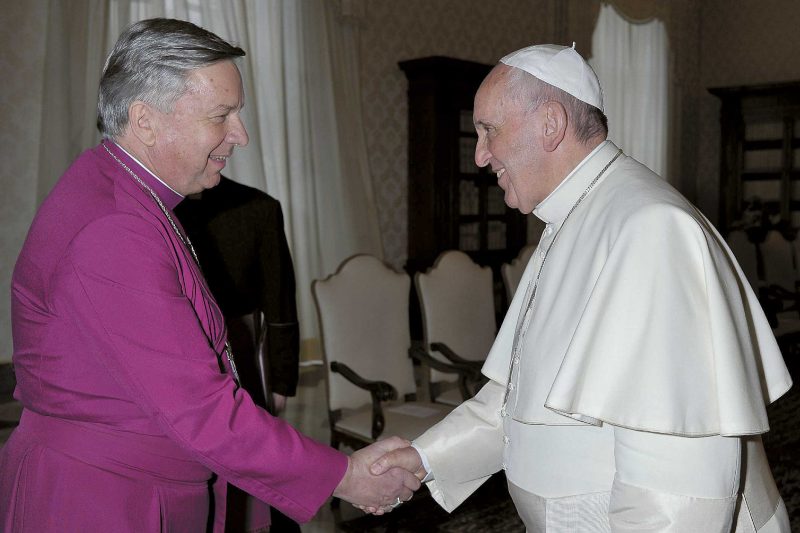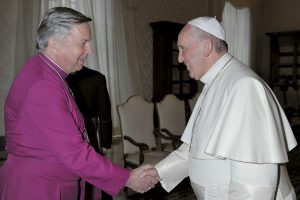by MICHAEL OTTO
The Anglican Archbishop of Canterbury’s representative in Rome has been awarded an honorary Doctorate of Literature by Massey University.
Archbishop Emeritus Sir David Moxon travelled from Rome to receive the honour at the university’s College of Humanities and Sciences graduation ceremony in Palmerston North last month.
Before he entered ministry, Archbishop Moxon worked as a tutor at Massey. He also gained a Master’s degree in Education and Sociology from Massey, one of several degrees he attained in New Zealand and the United Kingdom.
The archbishop is a former Anglican Bishop of Waikato and was formerly the senior Anglican bishop in the New Zealand dioceses.
He told media that he was surprised to receive the award. He reportedly chose not to offer advice to other graduates.
Instead, he encouraged them to use their education to benefit others and the wider community, not just their own careers.
“I learnt long ago that advice is never useful unless it has been tested by experience, and once you have the experience, you don’t need the advice,” he said.
The citation for Archbishop Moxon’s honorary doctorate came from former Governor-General Sir Anand
Satyanand, who is a Catholic. Sir Anand noted that Archbishop Moxon’s appointment to Rome almost
coincided with the election of Pope Francis.
“The winds that are beginning to blow from the new leader of the Catholic Church signal important developments for those of Christian denominations and their relationships with other religions,” Sir Anand stated.
Sir Anand noted that Archbishop Moxon’s role in the Anglican Roman Catholic International Commission saw him “positioned at the centre of huge developments in that field”.
In his capacity as director of the Anglican Centre in Rome, the archbishop recently blogged about an audience with Pope Francis, ahead of an ARCIC III meeting.
Archbishop Moxon praised the Pope for the collegial nature of his leadership of the Catholic Church.
This is shown by the Pope’s frequent reference to himself as “Bishop of Rome”, “emphasising the collegial nature of his authority, which he shares with other bishops”, the archbishop wrote.
He also praised the 2014 Extraordinary Synod on the Family, which included lay and ecumenical participation, as demonstrating Pope Francis’s “commitment to synodality within the Church”.
“The emphasis on the preaching of the Gospel in your Apostolic Exhortation Evangelii Gaudium, the simplicity of your personal lifestyle, your stress on ministry to the poor and marginalised,
and the positive role you have played in international reconciliation have all played their part in commending the ministry of the Bishop of Rome to Christians throughout the world,” Archbishop
Moxon said to Pope Francis.
Last month, during an interview with Vatican Radio, Archbishop Moxon said that there is broad
agreement on 80 per cent of core doctrine between the Catholic and Anglican churches.
But the remaining 20 per cent presents significant challenges, he observed.
Nonetheless, Pope Francis told ARCIC III members that ecumenical relations and dialogue are not secondary elements of the life of the churches.
“The cause of unity is not an optional undertaking, and the differences that divide us must not be seen as inevitable,” the Pope said.


Archbishop Moxon innocently manifests the difficulties of ecumenical progress when he praises Pope Francis for what he perceives as the Pope’s “emphasising the collegial nature of his authority, which he shares with other bishops”.
That might be the Anglican structure, but it ain’t Catholic.
When Pope John Paul II visited NZ, our own bishops were reprimanded for their publicity material which heretically described the Pope as “first among equals”.
The Pope’s authority is not shared with other bishops, thank God.